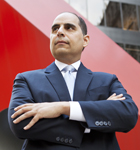 Construction is a very challenging industry. [But] I had two uncles that owned construction companies. I always went to their job sites in summers when I was on vacation. I really liked that, so I decided to go into construction.
Construction is a very challenging industry. [But] I had two uncles that owned construction companies. I always went to their job sites in summers when I was on vacation. I really liked that, so I decided to go into construction.
I came to the United States in 1983. I used to come to Dallas to buy construction equipment with my uncles. It was used and in good condition, and we took it to Mexico for our jobs. We had some equipment here that we were intending to take into Mexico, but then the Mexican government closed the border to imports. At the time, my wife and I had a one-year-old and another baby on the way. We thought about it and decided to come here and open our own company and utilize the same equipment.
I had a partner for 10 years, but then we decided to split up. I started with Omega Contracting, doing civil construction. Then we started doing general contracting with Azteca Enterprises in 1989. Our steel division came later, in the early ’90s.
We have been able to land some very important projects over the years—we’re working on the [$2 billion] renovation of [Dallas/Fort Worth International Airport] and we are part of the team building the new Parkland Hospital [in Dallas County]—but there is a lot of competition and it’s a very risky business. It’s the industry that gets hit first when the economy goes down and it’s usually one of the last industries to recover when the economy gets better.
It’s very hard to compete with bigger companies, especially in a down economy. Sometimes they beat us, and sometimes we beat them. We stay competitive, however, by focusing on productivity, pricing, and overhead costs. You have to control your costs and maintain good productivity. We check our productivity every day on every crew. It comes down to the systems we’ve installed and the processes we have in place. Safety and quality are priorities amongst our companies.
Also, the people. Over the years I’ve always tried to get the best people available. A lot of times, these people made more money than me, but I didn’t care. I wanted to hire good people—professional people—and empower them to do their best. Those people need to know you treat your employees right. That you have good values. My people know that because I maintain an open-door policy. I talk to them continuously. And when they have personal issues, I try to get involved and help them.
Part of what makes me an effective leader is that I understand what it takes to do the work. You can’t lead other people if you don’t know what it takes to do their job. Because I’ve always understood that the management of a company is just as important as the field performance, I used to run the field during the day and then at night handle the administration of the company. I even did my own accounting. You have to do it yourself first before you can expect someone else to do it.

